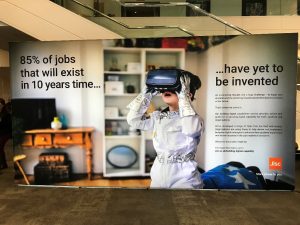The Business Partnering Team recently attended Digifest, a free edtech event organised by JISC which was held at the International convention Centre in Birmingham. Over two packed days we had the opportunity to see and hear what leaders at the forefront of the technology industry think about current education trends. We also took part in hands-on workshops with staff and students from other UK universities and colleges.
Key themes
The topics that featured most frequently at the event were:
- Digital skills gap
- Diversity in technology
- Artificial intelligence and chatbots
- Data – including analytics, ethics, strategy and decision making
Digital skills gap
It’s not possible to make the most of the opportunities that technology brings without people having digital competency, digital capability and digital literacy.

JISC predict that 85% of jobs in 10 years’ time don’t even exist yet! They also stressed the importance of preparing students for a world of work where life-long learning is expected in order to remain in employment. The global innovation foundation, Nesta, presented their Skills Taxonomy, highlighting the skills and jobs they see as high growth and most demanded by employers. There was also a discussion around people who are already in employment and how to support those who may be in careers that are at risk of being automated in the future and the opportunities to look at the transferable skills that career changers might bring into technology teams.
In a world where Artificial Intelligence, Machine Learning and Automation are becoming more prevalent, the skills that are likely to be in more demand from employers are the human skills that can’t be automated – for example: creativity (AI is now being used to create music but it needs creative people to learn from); empathy (we don’t want a chatbot telling a patient they have a terminal disease); and accountability (humans need to be able to overrule algorithms in some cases).
Diversity in tech
The line-up of presenters at the event felt balanced and representative and so it wasn’t unsurprising that the theme of diversity in technology teams was addressed in multiple sessions. Examples were shared on what can go wrong if services are developed by very similar people with very similar viewpoints (diversity in development teams helps to spot both opportunities and issues). A recent article on BBC News describes the importance of further research into computer algorithms to prevent gender or race bias in Artificial Intelligence.
Artificial Intelligence and chatbots
Several universities and colleges are starting to invest in chatbot technology and have released services to students which are shielding the students from the plethora of systems behind the scenes and there were some interesting demonstrations given by Bolton College and Lancaster University. There was also a student hackathon event that ran alongside the conference and one of the resulting products was a chatbot too – showing that it’s possible to get a proof of concept working within two days.
Data
There was less on Learner analytics than last year, but analytics and data still featured highly across numerous presentations and workshops. It was also seen as a key enabler of the newly forming vision of an Intelligent Campus.
Other key learnings
The other key learnings we took away with us were:
- Agility – it wasn’t necessarily the redbrick institutions with large organisational structures and budgets that were best at exploiting new technologies. The culture and ability to be agile and responsive to emerging trends is far more important in enabling progress than internal resources.
- Student mental health and wellbeing – we heard some quite shocking statistics and stories from a University GP. The key message was that student wellbeing needs to be a consideration of all aspects of the student journey and not just the responsibility of one team.
(A recent mental health survey reported that of the 37,500 students polled, over 50% reported self-harm and more than 87% struggle with anxiety). - Accessibility – an extremely useful session with contributions from JISC, GDS and AbilityNet. It was a call to action across all institutions and a reminder that legislation is already enacted and will be enforced from September 2019. This presents a huge opportunity for improving digital services, user experience and return on investment as well as mitigating the risk of being sanctioned or sued.
- Customer-driven / co-creation – digital strategy sessions stressed the move to user-focused, customer-driven services – with strategies acknowledging that services are created in partnership with customers. It is no longer enough to throw software at paying students and require them to adapt their expectations or behaviour! A Digital Strategy should be created with academic and other partners – in the case of Leicester University, it is co-owned.
Find out more
Our notes and conversations from the event are available on a Teams channel. If you want to access this to find out more the Teams code is: wruuy0x
